
Redevelopment is any new construction on a site that has pre-existing uses. It represents a process of land development uses to revitalize the physical, economic and social fabric of urban space.
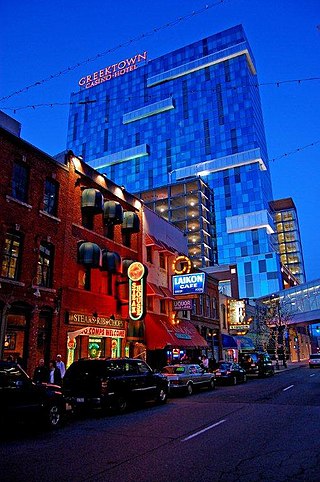
Hollywood Casino at Greektown, formerly Greektown Casino-Hotel, is a casino hotel in the Greektown neighborhood in Detroit, Michigan. It is owned by Vici Properties and operated by Penn Entertainment.

Brightmoor is a neighborhood located in Detroit, Michigan, near the northwest border of the city. Brightmoor is defined by the Brightmoor Alliance as being bordered by Puritan Road to the north, the CSX railway to the south, Evergreen Road to the east, and Outer Drive West, Dacosta Street, and Telegraph Road to the west. However, the demographics given here for the neighborhood are the city's statistical Master Plan Neighborhood area, which consists of eight census tracts that includes some areas outside of the Alliance's boundaries, but does not include some areas within its boundaries.

In urban planning, infill, or in-fill, is the rededication of land in an urban environment, usually open-space, to new construction. Infill also applies, within an urban polity, to construction on any undeveloped land that is not on the urban margin. The slightly broader term "land recycling" is sometimes used instead. Infill has been promoted as an economical use of existing infrastructure and a remedy for urban sprawl. Its detractors view it as overloading urban services, including increased traffic congestion and pollution, and decreasing urban green-space. Many also detract it for social and historical reasons, partly due to its unproven effects and its similarity with gentrification.

Ilitch Holdings, Inc. is an American holding company established in 1999 to provide all companies owned by Mike and Marian Ilitch with professional and technical services. Its privately held businesses include Little Caesars Pizza, the National Hockey League (NHL) Detroit Red Wings, the Major League Baseball (MLB) Detroit Tigers, Olympia Entertainment, Olympia Development, Olympia Parking, Blue Line Foodservice Distribution, Champion Foods, 313 Presents, the Little Caesars Pizza Kit Fundraising Program, Hockeytown Cafe, and a variety of venues within these entities. Ilitch Holdings subsidiaries manage Detroit's Fox Theatre, City Theatre, Comerica Park, Pine Knob Music Theatre, Michigan Lottery Amphitheater, Meadow Brook Amphitheater, and Little Caesars Arena, which replaced the Joe Louis Arena after closing in July 2017.
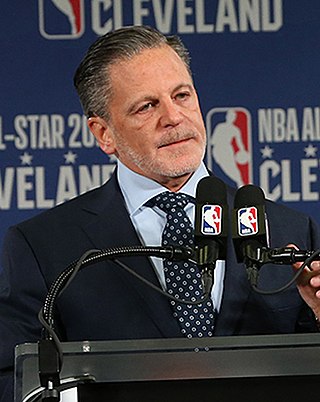
Daniel Gilbert is an American billionaire, businessman, and philanthropist. He is the co-founder and majority owner of Rocket Mortgage, founder of Rock Ventures, and owner of the National Basketball Association's Cleveland Cavaliers. Gilbert owns several sports franchises, including the American Hockey League's Cleveland Monsters, and the NBA G League's Cleveland Charge. He operates the Rocket Mortgage FieldHouse in Cleveland, Ohio, home to the Cavaliers and Monsters. As of January 2023, Forbes estimated his net worth at US$18.3 billion.
A statutory corporation is a government entity created as a statutory body by statute. Their precise nature varies by jurisdiction, but they are corporations owned by a government or controlled by national or sub-national government to the extent provided for in the creating legislation.
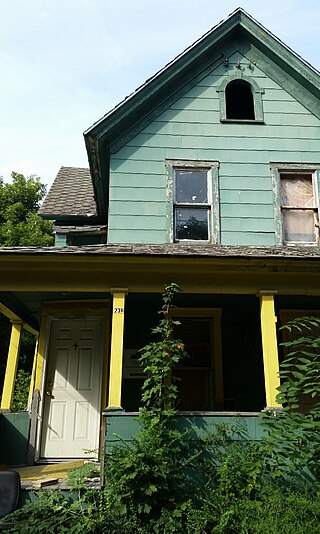
Land banking is the practice of aggregating parcels of land for future sale or development.
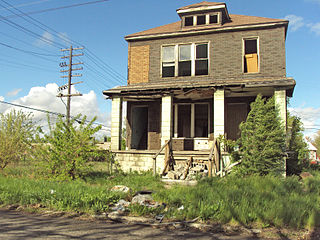
Shrinking cities or urban depopulation are dense cities that have experienced a notable population loss. Emigration is a common reason for city shrinkage. Since the infrastructure of such cities was built to support a larger population, its maintenance can become a serious concern. A related phenomenon is counterurbanization.

The Federal Reserve Bank of Chicago Detroit Branch Building, commonly called the Federal Reserve Building, is a bank building located at 160 West Fort Street in downtown Detroit, Michigan. It was listed on the National Register of Historic Places in 2008.
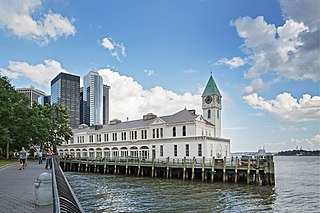
The New York Landmarks Conservancy is a non-profit organization "dedicated to preserving, revitalizing, and reusing" historic structures in New York state. It provides technical and financial skills to owners of historic properties. Since its founding, the conservancy has provided more than $60 million in grants and loans.
Non-profit housing developers build affordable housing for individuals under-served by the private market. The non-profit housing sector is composed of community development corporations (CDC) and national and regional non-profit housing organizations whose mission is to provide for the needy, the elderly, working households, and others that the private housing market does not adequately serve. Of the total 4.6 million units in the social housing sector, non-profit developers have produced approximately 1.547 million units, or roughly one-third of the total stock. Since non-profit developers seldom have the financial resources or access to capital that for-profit entities do, they often use multiple layers of financing, usually from a variety of sources for both development and operation of these affordable housing units.
The United Arab Emirates is a federation of seven Emirates, with autonomous federal and local governments. The UAE has historically been a low-tax jurisdiction. The federal government and local governments are entitled to levy taxes on citizens and companies. The federal government currently levies a value added tax, corporate income tax, and excise taxes. Some emirates levy property, transfer, excise and tourism taxes. Some emirates also charge corporate taxes oil companies and foreign banks.
Eliza Howell Park is a public park in Brightmoor, Detroit, Michigan. Howell Park, east of Telegraph Road between Fenkell Avenue and Schoolcraft Avenue, has 250 acres (100 ha) of land, making it the fourth largest park in Detroit; this is about one fourth of the area of Belle Isle or .25 square miles (0.65 km2). A greenway links Howell with Stoepel Park. Howell has a 1.5-mile (2.4 km) nature trail that, in 2009, was recently constructed.

Michael Edward Duggan is an American lawyer, businessman, and politician serving as the 75th mayor of Detroit, Michigan since 2014. A member of the Democratic Party, Duggan previously served as the Wayne County Prosecutor from 2001 to 2004, and as the deputy county executive of Wayne County from 1987 to 2001.
Hantz Woodlands, also known as Hantz Farms, is an urban tree farm on the lower east side of Detroit. The project has cleared more than 2,000 vacant city-owned lots, totaling more than 140 acres, and has demolished blighted homes and cleared empty lots to make way for a hardwood tree farm, bounded by E. Jefferson Avenue, Mack Avenue, St. Jean Street and Van Dyke Avenue. Hantz Woodlands is a project of Hantz Farms, LLC, a division of Hantz Group. It is the largest urban tree farm in the U.S.

The Greening of Detroit is an urban forestry program and non-profit partner in The Detroit Partnership; it was founded in 1989. In addition to planting trees in the Detroit area, the organization engages in urban forestry education, job training, and other community programs. In 2011, Greening planted 12,156 trees in Detroit, and as of November 2017 has planted over 100,000 trees in the city since the organization's inception. The organization is involved in urban farming, working to maintain and improve urban farms in Detroit. Greening is also working to improve air quality. Its annual operating budget is approximately $3.8 million. Lionel Bradford is the president of The Greening of Detroit.
Municipal disinvestment is a term in the United States which describes an urban planning process in which a city or town or other municipal entity decides to abandon or neglect an area. It can happen when a municipality is in a period of economic prosperity and sees that its poorest and most blighted communities are both the cheapest targets for revitalization as well as the areas with the greatest potential for improvement. It is when a city is facing urban decay and chooses to allocate fewer resources to the poorest communities or communities with less political power, and disenfranchised neighborhoods are slated for demolition, relocation, and eventual replacement. Disinvestment in urban and suburban communities tends to fall strongly along racial and class lines and may perpetuate the cycle of poverty exerted upon the space, since more affluent individuals with social mobility can more easily leave disenfranchised areas.
The Detroit Demolition Program was started in 2014 by a major push from Detroit Mayor Mike Duggan. The program relied on federal and state funding to remove commercial and housing properties that were not in use and had unlivable conditions. The plan was for 40,000 properties to be taken down to allow for property values to rise and have land for new homes and office space to be built in the city. Poverty and crime continue to impact the city, and the demolition program was created in hopes to improve conditions for the people living in the urban areas of Detroit. As of April 2019, the program is in effect with plans to continue for eight more years.
Eight Mile-Wyoming area is located nearly 10 miles (16 km) from Paradise Valley on the northern boundary of Detroit and minimally resembled inner-city neighborhoods. Originally settled in the 1920s by thousands of optimistic migrant farmers, the area became a settlement opportunity for Blacks to construct and own their own homes. The area was fought over for development and housing projects for decades and represented an isolated concentration of Blacks in a vast population of whites.












